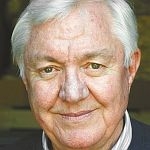 (Host) The Iron Lady, the new film about former British Prime Minister
(Host) The Iron Lady, the new film about former British Prime Minister
Margaret Thatcher has been nominated for an Academy Award for its star.
And as commentator and veteran ABC News foreign correspondent Barrie
Dunsmore tells us, the movie, like its subject, has stirred up strong
reactions.
(Dunsmore) I went to see The Iron Lady with great
anticipation. I was based in London for much of Margaret Thatcher’s time
in office. I met and interviewed her in the course of reporting on the
impact of Thatcherism in Britain and on the international stage. Like
her or not, she was a powerful political presence who significantly
shaped her times.
It was the Soviet news media that first dubbed
Thatcher the Iron Lady and she relished the title. It perfectly
described the image she constantly sought to project – that of a leader
of deep convictions who could never be intimidated. Indeed it took
steely determination for a woman whose father was a grocer, to fight her
way through centuries of English upper class snobbery to become her
country’s first female prime minister. This Thatcher comes through loud
and clear in a compelling and totally convincing performance by Meryl
Streep.
For those who may have been expecting a feminist message
in the film – there isn’t one because while Thatcher was indeed a
ground breaking woman, she lived in a man’s world and that’s the only
world that interested her.
The British critics fall into two
categories – and they are a reflection of the divisive nature of
Thatcher’s leadership. Those who loved Thatcher hate the film because it
skips over many of the fundamental changes she brought about in Britain
which they believe significantly made the country better.
Those
who disliked Thatcher for her seeming insensitivity to the human and
social consequences of her often harsh conservative policies also
dislike the movie because at times it makes her seem both a sympathetic
and even heroic character.
Personally, I take issue with the
director’s decision to devote so much time to Thatcher in her waning
years. We learned some time ago from her daughter Carol that her mother
has been suffering from dementia. And I understand the film using her
senility as an artistic device to allow her to reflect on her past life
through flash backs. But I would have preferred less of her dotage and
more of her history. For instance her personal interactions with Ronald
Reagan and Mikael Gorbachev as the Cold War was ending, were significant
parts of her legacy which were barely touched upon.
Yet
ultimately this film is not meant to be a history of the end of the Cold
War any more than Shakespeare’s Richard the III was a history of the
end of the Plantagenet dynasty of British monarchs.
This is a
very personal portrait of a once very important person. On that level I
think the film gets it pretty much right. With rare exceptions, movies
don’t do the sweep of history all that well. We still need to read books
for that purpose. But that doesn’t mean we can’t get a sense of
character from a thoughtful film – especially when that central
character is portrayed by a brilliant performer. By that measure, The
Iron Lady is a notable success.